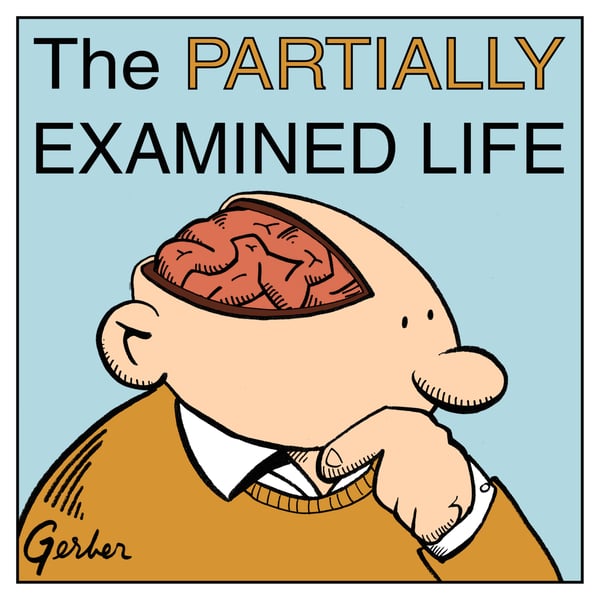Ep. 325: Paul Grice on Meaning and Conversation (Part Two)
The Partially Examined Life Philosophy Podcast
Mark Linsenmayer
4.6 • 2.3K Ratings
🗓️ 25 September 2023
⏱️ 56 minutes
🧾️ Download transcript
Summary
Continuing on "Meaning" (1957), "Utterer’s Meaning and Intentions" (1969), and "Logic and Conversation" (1975) with guest Steve Gimbell.
We tie the articles together, talk more about the rules implicit in conversation, and try to relate Grice's project to other parts of philosophy.
Get more at partiallyexaminedlife.com. Visit partiallyexaminedlife.com/support to get ad-free episodes and a supporter-exclusive part three to this discussion.
Transcript
Click on a timestamp to play from that location
| 0:00.0 | This is the partial exam of Life Episode 325, part 2. |
| 0:11.0 | We've been talking about Paul Greiss with Professor Steve Gimbal. Welcome back. |
| 0:16.0 | We should look a little more at the main concepts in the third paper from Greiss that we had on the table. |
| 0:24.0 | Logic in conversation from 1975. |
| 0:26.0 | I mean, you could see it as a completely different project or you could see it as the culmination of his earlier project on meaning. |
| 0:33.0 | Where do you actually stand Steve? You presented it as if it were the culmination, the latter. |
| 0:37.0 | But it seems like it's as far as the scholarship goes, it might be sort of an independent launching of a thousand ships, just like the 57 paper was. |
| 0:45.0 | That's fair enough, but I think it really is he takes a huge step in a new direction but in order to answer the old question. |
| 0:54.0 | So the original question that he's dealing with is, how do we understand each other? How do I get what you mean when you talk? |
| 1:01.0 | And yet we do, somehow we, despite the fact that we can't get inside of each other's heads, I understand your intentions most of the time. |
| 1:10.0 | And what's weird is that when you look at how we talk, if you were to take a normal conversation and then just type it out. |
| 1:19.0 | Most of what you see does not follow in any way from what was previous and yet it's a smooth flowing conversation. |
| 1:28.0 | And somehow when you look at responses, they make perfect sense if you know how to speak the language. |
| 1:35.0 | But if you were just say a computer, this would seem like a complete non-sequitor. |
| 1:40.0 | And so what we're seeing in this third paper is sort of this ultimate answer to how do I understand what you mean when what you say isn't what you mean. |
| 1:54.0 | Okay, so in your email response, Steve, where you said you would come on and do the show, you made a mention of kind of like a general criticism that we can bring up later of the grisy and perspective, if you will. |
| 2:06.0 | But you just raised a really interesting point. So we exist in the world of audio. That's what we do. That's what podcasting is, even though I'm looking at you now on a screen. |
| 2:16.0 | The video will disappear forever. |
| 2:19.0 | Much to the degree of our adoring fans, I'm sure, but we frequently get asked for transcripts and there's lots of reasons why for my SEO and all kinds of other perspective you should get transcripts. |
| 2:33.0 | When you see a transcript of us having this conversation, I don't want to say it's literally an unintelligible, but it requires a massive amount of editing to make any kind of sense of. |
| 2:45.0 | And so I'm wondering if when, you know, what did they call it the linguistic turn in analytic philosophy? |
| 2:52.0 | Yes, we've talked about positivism versus, you know, versus some kind of like performative, but like did analytic philosophy in your perspective, and by the way, Mark and Dylan, you chime in here. |
... |
Please login to see the full transcript.
Disclaimer: The podcast and artwork embedded on this page are from Mark Linsenmayer, and are the property of its owner and not affiliated with or endorsed by Tapesearch.
Generated transcripts are the property of Mark Linsenmayer and are distributed freely under the Fair Use doctrine. Transcripts generated by Tapesearch are not guaranteed to be accurate.
Copyright © Tapesearch 2025.

